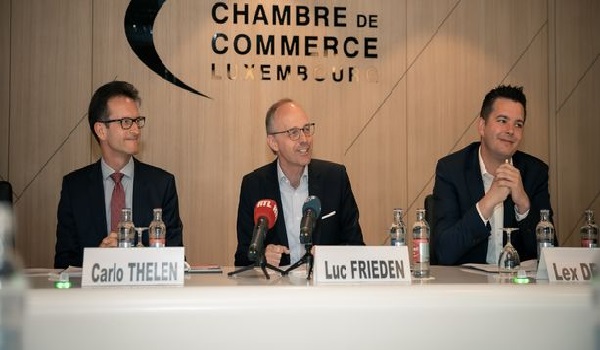 L-R: Carlo Thelen, Managing Director of the Chamber of Commerce; Luc Frieden, President of the Chamber of Commerce; Lex Delles, Minister of the Middle Classes and Tourism;
Credit: Chambre de Commerce Luxembourg
L-R: Carlo Thelen, Managing Director of the Chamber of Commerce; Luc Frieden, President of the Chamber of Commerce; Lex Delles, Minister of the Middle Classes and Tourism;
Credit: Chambre de Commerce Luxembourg
On Tuesday morning, the Chamber of Commerce presented its 2018 activity report at a press conference held at its premises in Luxembourg-Kirchberg.
The presentation of the 2018 annual report was an opportunity for the Chamber of Commerce to unveil its new development strategy for 2025 and to present, in the presence of Minister of Middle Classes and Tourism Lex Delles, the numerous actions taken for SMEs. On the same occasion, Luc Frieden, President of the Chamber of Commerce, presented the priorities of his mandate at the head of the Chamber of Commerce, which today represents the interests of 90,000 companies.
In 2018, the Chamber of Commerce analysed the potential impact on the life of Luxembourg companies of more than 300 Grand Ducal laws and regulations, involved more than 4,000 representatives of companies and institutional partners in its internationalisation activities, trained some 220 people everyday via the courses offered by the House of Training and the Higher Institute of Economics (ISEC) in particular, managed nearly 2,000 apprenticeship contracts in 25 different professions and advised more than 9,000 entrepreneurs and clients within the House of Entrepreneurship.
The year 2018 was also marked by the successful launch of the House of Startups, as well as awareness campaigns on digitalisation and new data protection regulations to prepare companies for the RGDP challenge.
For Carlo Thelen, Managing Director of the Chamber of Commerce, all the work done by the teams of the Chamber of Commerce pursues the same objective, that of "supporting Luxembourg companies in their development and helping them to evolve in a competitive and changing environment". Indeed, the launch of the House of Startups on 1 June 2018 allowed the Chamber to complete its range of services so that it could now function as a group with structures and entities covering all the needs of Luxembourg entrepreneurs and companies.
Regarding the 2025 Strategy, the Chamber of Commerce began a process of reflection in 2017 which led to the adaptation of its strategic vision. This process involved a holistic and participative approach, including companies, elected members, employees as well as federations and professional associations. This work of reflection and consultation was completed by conducting a strategic orientation survey of all member companies to identify, in a bottom-up approach, the expectations of business leaders of the Chamber. The resulting Strategic Plan CC2025 thus summarises these results by defining the values, vision, missions and strategic and operational objectives that will guide the action of the Chamber of Commerce by 2025.
Anxious to adopt a client approach in all its actions, the Chamber of Commerce has placed its member companies at the centre of its thinking and organisation with the aim of creating value for them through its actions. The quality of the services provided is therefore a central and permanent concern of the Chamber of Commerce. Above all, it is about offering companies effective support to face the many challenges posed by a changing economy, such as access to a skilled workforce, skills development, digitalisation and internationalisation.
The second part of the press conference was devoted to SME policy. Lex Delles, Minister of the Middle Classes and Tourism, emphasised the good cooperation of his ministry with the various departments of the Chamber of Commerce and especially with the House of Entrepreneurship: "SMEs are the engine of economic growth and creation jobs in Luxembourg. With the support of the Chamber of Commerce, we ensure that the legislative framework is conducive to the creation and development of middle-class enterprises". Delles cited the House of Entrepreneurship of the Chamber of Commerce, which brings together several players involved in business creation processes under one roof, as a good example of administrative simplification.
Carlo Thelen then recalled that the Chamber of Commerce has applied its actions to the principle of "Think Small First" intended to offer SMEs the most favourable business environment possible. In this context, he drew up a positive assessment of the 2018 activity of the House of Entrepreneurship: no less than 9,178 entrepreneurs were advised on the spot and more than 1,500 people took part in the Entrepreneurs' Days conference cycle, whose goal is to promote entrepreneurship and to treat topics of importance for this target. The presentation also highlighted the success of the Go Digital programme, to which 878 companies applied in its first year and which has already convinced more than 2,300 participants in the months of January to April of the current year.
Finally, Luc Frieden, who took the presidency of the Chamber of Commerce on 3 April 2019, welcomed collaboration with the General Directorate of Middle Classes of the Ministry of Economy before explaining his priorities for the five-year term of office. These were namely responding to the "challenges posed to businesses by digitalisation, the internationalisation of trade and the lack of qualified personnel in sectors of the future, but also in many more traditional sectors". He emphasised the need for proactive engagement with these topics on behalf of the Chamber and explained the establishment of "working groups to develop proposals and concrete responses to these issues and this involving all economic sectors represented in the Chamber of Commerce".








